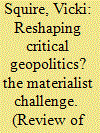| Srl | Item |
| 1 |
ID:
115668


|
|
|
|
|
| Publication |
2012.
|
| Summary/Abstract |
Index decomposition analysis based on economic output is frequently employed to provide an indication of energy intensity trends in industry. Additionally, composite energy efficiency indicators, calculated using physical output, are used to give a more accurate view of energy efficiency progress. Both approaches are commonly presented in one study but often with a different mathematical basis for each. This may lead to inconsistent results. We demonstrate using practical case studies that when all physical and economic output data are available for industry sub-sectors, these can be combined in a single decomposition analysis that provides an energy efficiency indicator based on physical production and an indicator of the influence of structural change based on value added. Using the same methodology for both results ensures that the results are consistent and provides insights into the effects of changing prices of goods on aggregate energy intensity. In the case studies examined, falling unit values of industrial goods produced over time tend to increase the energy intensity of industry.
|
|
|
|
|
|
|
|
|
|
|
|
|
|
|
|
| 2 |
ID:
139573


|
|
|
|
|
| Summary/Abstract |
How can the ‘materialist turn’ contribute to the reshaping of critical geopolitics? This article draws attention to the limits of an approach that emphasises the representational, cultural, and interpretive dimensions of geopolitics, while acknowledging the difficulties of an ontological shift to materiality for many scholars of critical geopolitics. It draws on the work of Karen Barad and Annemarie Mol in order to advance three arguments for the reshaping of critical geopolitics as a field of research. First, it argues for an approach to the analysis of power that examines materialdiscursive intra-actions and that cuts across various ontological, analytical, and disciplinary divides. Second, it argues for an analysis of boundary-production that focuses on the mutual enactment or co-constitution of subjects, objects, and environments rather than on performance. Third, it argues for an analytical approach that engages the terrain of geopolitics in terms of a multiplicity of ‘cuts’ that trouble simplifying geopolitical imaginations along with the clear-cut boundaries that these often imply. In so doing, the article makes the case for a more-than-human approach that does not overstate the efficacy of matter, but rather that engages processes of materialisation and dematerialisation without assuming materiality to be a determinant force.
|
|
|
|
|
|
|
|
|
|
|
|
|
|
|
|